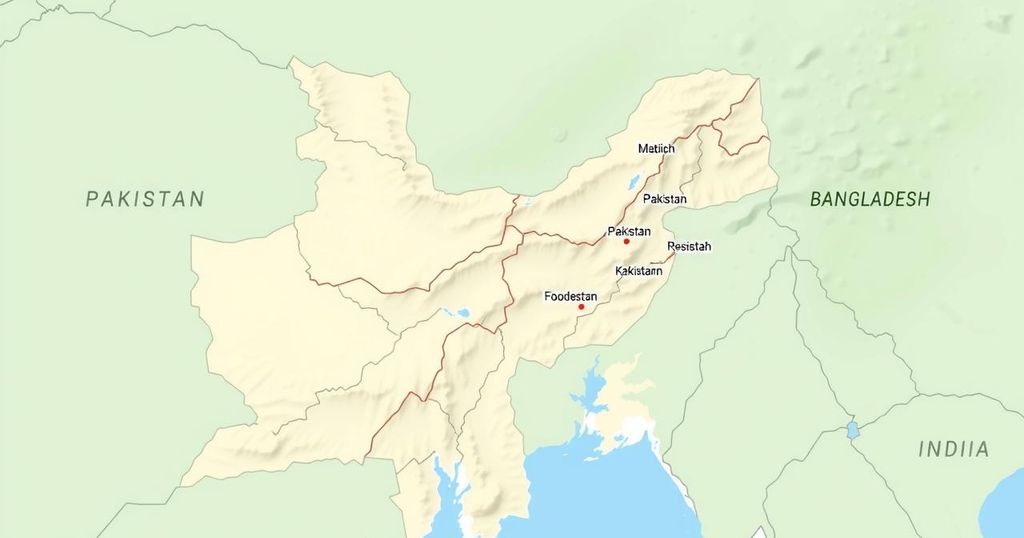Pakistan and Bangladesh Strengthen Ties: Implications for India

Bangladesh is strengthening ties with Pakistan after political changes, reviving trade, military contacts, and diplomatic relations. This shift is viewed with caution by India, especially given historical tensions. Experts suggest a strategic alliance against Indian dominance, despite unresolved issues stemming from the 1971 war. Economic opportunities also present potential for improved relations, contingent on reducing trade barriers and political changes in upcoming elections.
Recent political upheavals in Bangladesh have ushered in an unexpected shift towards closer ties with Pakistan, following the ousting of Prime Minister Sheikh Hasina last year. Notably, the two nations commenced direct trade for the first time in decades, with Bangladesh importing 50,000 tonnes of rice from Pakistan. Additionally, they reinstated direct flights, revived military contacts, simplified visa processes, and reportedly initiated cooperation on security matters.
The historical enmity between Bangladesh and Pakistan dates back to the struggle for independence in 1971 when Bangladesh, then East Pakistan, fought against Islamabad. India supported the Bengali rebels during this nine-month conflict, resulting in Bangladesh’s emergence as a sovereign nation. Despite the enduring trauma from that period, Bangladesh maintained amicable relations with Pakistan between 2001 and 2006, but Hasina’s tenure from 2009 saw a distancing from Pakistan due to her alignment with India.
As Hasina’s government faced mass protests resulting in her departure to India, analyses indicate a resurgence of relations with Pakistan, with Humayun Kabir, a former Bangladeshi diplomat, remarking that the relationship is evolving back towards that of “two normal neighbours”. This newly warming relationship is being observed with caution in India, given its historically antagonistic ties with Pakistan, and deteriorating relations with Bangladesh following Hasina’s exit.
Experts suggest that the renewed partnership between Dhaka and Islamabad may be strategic, with Ayesha Siddiqa, a Pakistani academic, asserting that they seek to collaboratively counter India’s influence. Key interactions have included meetings between Bangladeshi interim head Muhammad Yunus and Pakistani Prime Minister Shehbaz Sharif at multilateral venues, reflecting improved diplomatic engagements.
Military cooperation has also surfaced as a critical aspect of this rekindled relationship. A Bangladeshi military delegation recently visited Pakistan for discussions, and the Bangladeshi navy participated in a multinational maritime exercise off Karachi’s coast. Veena Sikri, a former Indian high commissioner to Bangladesh, describes these developments as a “déjà vu” situation reminiscent of past tensions over Indian insurgents allegedly receiving training in Bangladesh facilitated by Pakistan’s intelligence agency.
Despite allegations and concerns, the Yunus administration denies reports of Pakistani operatives in Bangladesh and asserts that claims of reopened insurgent camps are unfounded. Analysts warn that the resurgence of military ties represents a significant security challenge for India, especially alongside Pakistan’s revival of relations with Bangladeshi Islamist parties that have historical connections to the independence movement.
While the historical context complicates relations, Bangladesh recognizes that economically and culturally, a confrontational stance towards India is unfeasible. Consequently, Dhaka maintains that relations with Pakistan cannot normalise until unresolved issues stemming from the 1971 war are addressed, including calls for a formal apology from Pakistan over past atrocities. This sentiment is echoed by former Pakistani military personnel, articulating that acknowledging past wrongs is essential for future cooperation.
Economists advise that Bangladesh and Pakistan could enhance bilateral trade, currently around $700 million, largely skewed in favor of Pakistan. The 250 million-strong population of Pakistan represents a potential market for Bangladesh, with practical issues such as tariffs and travel restrictions hindering bilateral business. Analysts believe that a political rapprochement could facilitate these trade discussions, particularly during the upcoming visit of Pakistan’s foreign minister to Dhaka.
As Bangladesh prepares for general elections later in the year, stakeholders will be vigilant. The ensuing government could present a new foreign policy orientation affecting the dynamics between Bangladesh, Pakistan, and India. India’s interest remains focused on fostering a stable and amicable Bangladesh to sustain peace and stability in its northeastern regions.
In summary, the evolving relationship between Bangladesh and Pakistan marks a significant geopolitical shift, characterized by revived trade, military ties, and diplomatic engagements. Despite historical animosities, the renewed cooperation reflects strategic considerations against India’s influence. However, unresolved historical grievances remain a barrier to full normalization, necessitating careful management of regional dynamics to ensure stability in South Asia as a whole.
Original Source: www.bbc.com








